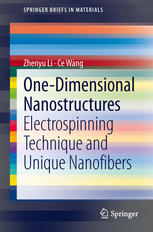

Most ebook files are in PDF format, so you can easily read them using various software such as Foxit Reader or directly on the Google Chrome browser.
Some ebook files are released by publishers in other formats such as .awz, .mobi, .epub, .fb2, etc. You may need to install specific software to read these formats on mobile/PC, such as Calibre.
Please read the tutorial at this link: https://ebookbell.com/faq
We offer FREE conversion to the popular formats you request; however, this may take some time. Therefore, right after payment, please email us, and we will try to provide the service as quickly as possible.
For some exceptional file formats or broken links (if any), please refrain from opening any disputes. Instead, email us first, and we will try to assist within a maximum of 6 hours.
EbookBell Team

4.8
94 reviewsOne-Dimensional Nanostructures: Electrospinning Technique and Unique Nanofibers is a comprehensive book depicting the electrospinning technique and related 1D unique electrospun nanofibers. The first part of the book focuses on electrospinning technique, with chapters describing Electrospinning setup, electrospinning theories, and related working parameter. The second part of the book describes in detail specific topics on how to control the electrospun fiber properties such as how to control the fiber direction, how to control the fiber surface morphology, how to control the fiber structure, and how to construct 3D structures by electrospun fibers. The final part of the book depicts the applications of the electrospun nanofibers, with sections describing in detail specific fields such as electrospun nanofiber reinforcement, filtration, electronic devices, lithium-ion batteries, fuel cells, biomedical field, and so on.
One-Dimensional Nanostructures: Electrospinning Technique and Unique Nanofibers is designed to bring state-of-the-art on electrospinning together into a single book and will be valuable resource for scientists in the electrospinning field and other scientists involved in biomedical field, mechanical field, materials, and energy field.
Dr. Zhenyu Li is an associate professor at the Dept. of Chemistry, Jilin University, Changchun, P. R. China. Currently, he also holds the position in Australian Future Fibres Research & Innovation Centre, Institute for Frontier Materials, Deakin University, Geelong, Victoria, Australia.
Dr. Ce Wang is a professor at the Dept. of Chemistry, Jilin University, Changchun, P. R. China.